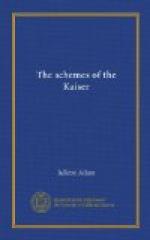“The deputy Bebel advises us to adopt a tribunal of International Arbitration. He admits the possibility that such a tribunal might raise some day the question of Alsace-Lorraine; he insinuates that we were to blame for the outbreak of war in 1870, and that there are those who maintain this idea with even greater strength and assurance than himself. Well, then, if such a tribunal should come together, and should express, no matter in what connection, its opinion on the question of Alsace-Lorraine, and if that opinion should be to the effect that Germany should hand back Alsace-Lorraine, I am convinced that Germany would never submit to such a decision, and that she would rather shed her blood to the last drop than to hand back these provinces.”
To which Herr Bebel naturally replied—
“When one holds ideas of this kind, it is perfectly evident that one cannot admit of International tribunals.”
Before his little speech, His Majesty the German Emperor had made a big one, from which we learned yet once again that William I had been entrusted with a mission, and had handed it down to William II; and then we heard once more the phrase with which Bismarck had deafened our ears, on one of his blustering days, and which the King of Prussia has re-issued in a new form and on his own account: “We Germans fear God and nothing else in this world.”
Well, Sire, I for my part believe that your Majesty fears something else besides God, and that is the disintegration of the Triple Alliance.
March 29, 1893. [4]
William II is ever at pains to invest those occasions in which his personality plays a part, with all the glamour of Imperial pomp. Once again, accompanied this time by an enormous retinue of Germans glad of the occasion of a free trip to a sunny land, William II is about to remind the Romans at Rome of the majesty of the Caesars. May their King not be reminded at the same time, by certain aspects of this triumphal procession, of Rome’s captive kings. In binding herself to Germany, has not Italy given herself over into bondage to the Teuton and especially to Austria, her hereditary foe? I could readily answer this question in the affirmative by looking back into the past, I who have so often shared in the patriotic emotions of Italy in bygone days; but every people is entitled to be the sole judge of its own destinies, and its best friends abroad have no right to endeavour to enlighten it by any rays which do not fall from its own heaven above. One can easily lead a nation astray, even by means of truths that have been clearly demonstrated beyond its frontiers. One is compelled to admit that the most extraordinary events may occur amongst one’s neighbours.




